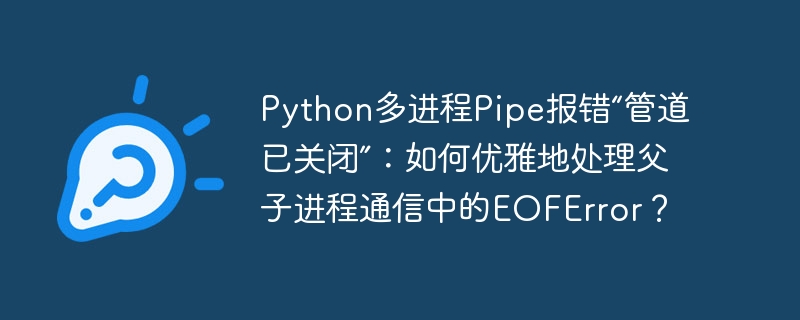
Python多进程Pipe的“管道已关闭”错误及解决方案
使用Python的multiprocessing模块中的Pipe进行父子进程通信时,可能会遇到“管道已关闭” (EOFError) 错误。本文分析此问题并提供解决方案。
问题描述: 子进程长期运行(例如,启动Web服务器),主进程在子进程结束前退出,导致子进程收到“管道已关闭”错误,程序崩溃。
代码分析: service.py模拟一个长期运行的子进程,通过管道接收主进程信号;single.py作为主进程,启动子进程并接收返回信息。 问题在于主进程快速退出时,子进程阻塞在child_conn.recv(),等待主进程信号,但管道已关闭,引发错误。
立即学习“Python免费学习笔记(深入)”;
错误原因: 主进程在子进程完成child_conn.recv()前退出,子进程尝试从已关闭的管道读取数据,导致EOFError。
解决方案: 在子进程中添加异常处理,捕获EOFError。当主进程提前退出,子进程收到EOFError后,优雅地结束,避免程序崩溃。
改进后的代码:
service.py:
import os
from multiprocessing import Process, Pipe
def start_child_process(child_conn):
child_conn.send({"port": 123, "ret": 1, "pid": os.getpid()})
try:
signal = child_conn.recv() # 等待主进程信号
if signal:
child_conn.close()
except EOFError as e:
print(f"Pipe closed gracefully: {e}") # 优雅处理EOFError
class Server:
def __init__(self):
self.parent_conn, self.child_conn = Pipe()
self.child = None
def run(self):
self.child = Process(target=start_child_process, args=(self.child_conn,))
self.child.start()
data = self.parent_conn.recv()
result = {"endpoints": {"http": f"http://127.0.0.1:{data['port']}/cmd", "ws": f"ws://127.0.0.1:{data['port']}/api"}}
return result
def stop(self):
self.parent_conn.send(True)
self.child.join()
self.child = None
if __name__ == "__main__":
server = Server()
r = server.run()
print("r:", r)single.py:
from service import Server
import time
def main():
server = Server()
result = server.run()
print("r:", result)
time.sleep(5)
server.stop() # 解除注释,测试优雅退出
if __name__ == "__main__":
main()通过在start_child_process函数中使用try...except块捕获EOFError,即使主进程提前退出,子进程也能正常结束,避免了“管道已关闭”错误。 但这只是错误处理,更完善的方案可能需要考虑其他进程间通信机制或信号处理。
以上就是Python多进程Pipe报错“管道已关闭”:如何优雅地处理父子进程通信中的EOFError?的详细内容,更多请关注php中文网其它相关文章!

每个人都需要一台速度更快、更稳定的 PC。随着时间的推移,垃圾文件、旧注册表数据和不必要的后台进程会占用资源并降低性能。幸运的是,许多工具可以让 Windows 保持平稳运行。

Copyright 2014-2025 https://www.php.cn/ All Rights Reserved | php.cn | 湘ICP备2023035733号